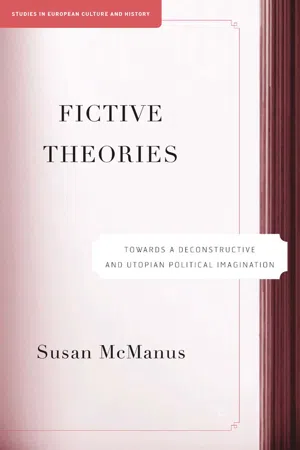
- English
- PDF
- Available on iOS & Android
About this book
Fictive Theories is a significant and innovative intervention in key debates in political theory concerning the ways theory should be philosophically grounded, and the task that political theory should set itself. Susan McManus argues that political theory has been grounded in controlling fictions (from fictions of human nature, to morals laws) that function to close possibility. Starting by interrogating the often hidden work of fictions in political theories, she argues that all theorizing is a form of world-creating. Rather than hiding the fictions at work in political theory, McManus argues that theory should become self-consciously fictive, and that there are political and ethical advantages to so doing. She then develops a uniquely deconstructive and utopian understanding of the project of political theory grounded in the 'fictive': a creative and future-oriented imagination. Rather than seeking to provide blueprints of how a polity should be organized, fictive theories seek to fabricate futures through the anticipatory articulation of possibility. Drawing on a rich range of thinkers from the traditions of political theory (Hobbes, Rousseau, Kant), deconstructive theory (Roland Barthes, Jacques Derrida) and utopian studies (Ernst Bloch), this book will be of interest to researchers, teachers and students in the fields of political theory, utopian studies, literary theory and cultural studies.
Frequently asked questions
- Essential is ideal for learners and professionals who enjoy exploring a wide range of subjects. Access the Essential Library with 800,000+ trusted titles and best-sellers across business, personal growth, and the humanities. Includes unlimited reading time and Standard Read Aloud voice.
- Complete: Perfect for advanced learners and researchers needing full, unrestricted access. Unlock 1.4M+ books across hundreds of subjects, including academic and specialized titles. The Complete Plan also includes advanced features like Premium Read Aloud and Research Assistant.
Please note we cannot support devices running on iOS 13 and Android 7 or earlier. Learn more about using the app.
Information
Table of contents
- Cover
- Contents
- Acknowledgments
- Introduction: The Politics of Fictive Theories: Reading/Writing/Theory
- Part I Speculative Beginnings
- Part II Fictions of Self-Evidence
- Part III Fabricating the Future
- Toward a Conclusion: Fictive Theories and Creative Epistemologies of Possibility
- Notes
- Bibliography
- Index